IBID: A Life Read online
Page 3
In the 1930s, Mr. Ripley wanted to put us in his newspaper feature, but the townspeople squeezed their eyes into little slits and said, “You better not.”
The Twentieth Century was generally uneventful except that Main Street burned down in 1918 caused by an incident of self-combustion that was recently featured on the television program, “Fire From Within.” In 1924, Babe Ruth came to town and played some sandlot baseball with some of our boys until he found out that the uncle of one of his Yankee teammates had been lynched here when some of the townspeople thought that he was an anarchist. There isn’t a lot of evidence that he was an anarchist, but he did look like one of those Italian Negroes who had always given us so much trouble.
When the hostages were taken in Iran, we held a young Iranian man against his will in the basement of the hardware store to show him what it was like. It was a lesson he would never forget!
I hope this information has been of some use to you. Let me know if you ever decide to spend some time in Clume. There’s lot’s of room!
Yours sincerely,
Ada Demion
10. Jonathan had his heroes. Buffalo Bill was not one of them. The following letter speaks for itself.
April 4, 1899
Dear Buffalo Bill,
What do you do each day? I can guess. I’ll bet you get up in the morning and stretch and yawn and then reach for your rifle and point it out the window and kill a grazing buffalo that has come a little too close to your cabin for his own good. And then you make yourself a big breakfast of scrambled eggs and hot cakes and sausage and while you are chowing down, you look up and there is another buffalo all tangled up in your clothesline and you shoot him in the head because, why, he’s all tangled up the clothesline, will you lookit! And you go down the lane to visit with your friends Wild Bill Hickok and Calamity Jane and’Ol Doc Grubbs and along the way you just happen to kill a buffalo or two, because they were getting just a little too close, if you want the truth of it. And when you finally reach your friends you all go prancing about together in fancy plumey hats and you decide to have a picnic—a buffalo-killing picnic. And you eat a devil egg and blam! blam! Did you see him topple? Tasty egg, Jane. Blam! Blam! And then later you play some baseball and you slide into home plate and everybody is still cheering while you get up and run over with your baseball bat and beat a nearby buffalo into a motionless fur mound. And that night you go to the theatre to see a hootchie kootchie show and a buffalo comes out on stage. And you jump to your feet. “What’s that buffalo doing up on that stage!” you say. “This is no buffalo show! This is a hootchie kootchie show!” And you shoot the buffalo right between the eyes. And it falls over dead and you sit back down and say, “Somebody get that dead buffalo off the stage! On with the show!” And on the way home that night, you guessed it. A buffalo comes out of nowhere. And then another and another. It is a whole herd that is crossing the road and you wish that you had more ammunition because you can’t kill as many of them as you’d like, and you are gnashing your teeth and saying to your friends, “Why it’s too danged dark! I’m only crippling them, Gawd-darnit! Oh well. A crippled buffalo is better than a happy, healthy frisky one.” And when you get home and go to sleep, I think I know what you dream of. Do I have to say?
When they are all gone, Mr. Bill, what will you do? What will you do then, I wonder?
Your friend,
Jonathan Blashette.
(PS. I am eleven and I have three legs. And I wish that you would go to Florida and kill alligators for a change.) JBP.
11. Jonathan knew the moment he met Mr. Grund that his life was about to change forever. In Cordell Glover’s monumentally flawed, indolently under-researched, and offensively over-embroidered biography of Blashette, Three Legs, One Heart: The Story of Jonathan Blashette, (Fairhope, Alabama: Hollon House, 1989)—from which I have drawn sparingly and only when other sources are in full corroboration—the biographeraster provides us with a ludicrously contrived, yet too deliciously accoutered description of the arrival of Thaddeus Grund to the town of Pettiville that pivotal autumn afternoon of 1900 for me not to include at least a paragraph or two for your amusement:
“The train was late. Oh it was late all right, and everybody knew it. The crowd that had gathered at the station shifted from leg to leg, in one great concerted sway of impatience, like an enormous beast with many heads and twice as many legs hungry—hungry for what?—the beast only knew this: that a banquet awaited one of their number. The young twelve-year-old, the one they called “Jonathan” or “Triple Threat” or “Spare Shoe.” And the beast sniffed. Sniffed and snorted loud and without apology. They could all smell it; the pungent odor of fate, of a destiny materializing. Grund was Pettiville-bound and bearing a wheelbarrow full of cash. And they smelled the cash, the people did, with nostrils opened and stretched clean and wide by the sweet perfume of fame and fortune. The boy was brought to the edge of the platform, held aloft, as a distant whistle announced the iron horse’s arrival. As the steam folded back like a great wet curtain and the locomotive pushed through, chug-a-chugging into the Pettiville station, the crowd itself whistled and tooted and tossed the boy high into the air, ready to deliver him to a future of assured acclaim. The tracks sang out and the men and the women and the little ones with two legs, each sang out as well. The train slowed and stopped, and the man who would mold young Jonathan’s future like a potter of brash fate, with muscular, knowing hands, stepped down from the train and smiled and tousled the boy’s dusty brown hair. And a cheer went up. And tears flowed down the excitement-rubied cheeks of Addicus and Emmaline Blashette. Tears of loss, for, yes, the child would be taken from them within hours, but tears, yes, also of joy for what the future might hold for this most special child. And the crowd parted and made way for Addicus and Emmaline and Jonathan and their evening guest, the spangled showman Thaddeus Grund, to climb into the festooned barouche that would transport the foursome to the Blashette farm. To talk of a future bright, of a destiny held in the hand and grasped firmly and kissed and sniffed and stroked with tender anticipation.
It was a night the boy would always remember.”
The train, in fact, wasn’t late. It was on time. And no one had gathered on the platform but Addicus and his farmhand Bill Boils. Jonathan was off picking apples for a “last meal” lattice pie. To be sure, Addicus was aware that Thaddeus Grund’s Traveling Circus and Wild West Show was popular and successful, and might provide ample income for the struggling Blashettes, but Emmaline’s resistance had diminished the ebullience of the welcome. The three men rode back to the Blashette farm in a rickety buckboard, in funereal silence. Emmaline wasn’t even around when her husband and his showman guest arrived. She had ventured off to Inspiration Creek where she wept in protected solitude for the future of her special child.
4
UNDER THE BIG TOP
1. “Hello Mr. Diary.” Biographers of Jonathan Blashette are indebted to their subject for a couple of reasons. From the first week of his employment with the Grund Circus, Jonathan put down his thoughts and impressions and a detailed listing of each day’s activities in a diary—a habit to which he would hold for the rest of his life. We are indebted to Jonathan, as well, for carefully maintaining this collection of diaries, and for entrusting them to the perpetual custody of the Pettiville Library and Interpretive Center to which he also bequeathed the rest of his voluminous papers and many of his personal effects. This institution offers researchers unrestricted access and extensive assistance, including, even, a daily refreshment hour of tea and “biscuits,” and the occasional neck massage.
In a bizarre sense, it is almost as if Jonathan anticipated me in particular. It was as if he knew of my special affinity for Mint Milanos and Malawi tea, and the fact that I can always do with a good neck rub.
In a codicil to his will Jonathan writes:
“I have few secrets. Most who know me know this. I should be flattered if some future researcher or biographer found this life important
enough to write about. I know that it was an odd one, to be sure. But then isn’t each life unique in its own way? Delve if you wish into the eclectica of my existence on this planet and marvel at the incongruities, as I myself have marveled over them. That a country boy with three legs would grow up to hobnob with nabobs alongside “jest plain bobs” and girls who bob their hair, and guys named Harry and hairy French guys named Guy, and I better stop here before my heirs begin to question the compos of my mentis!
Welcome all comers! Friend and enemy alike. Turn my pages all you wish, for I am and have always been an open book.
Life has treated me well—a life which I have always shared with others, and which I now share with you, bob and nabob alike.”
These words were obviously penned prior to Jonathan’s descent into the depths of gut-wrenching late-life reassessment. All tellers of the story of Jonathan Blashette are grateful that their subject postponed this intense self-examination until after his papers were donated to the Pettiville Library and Interpretive Center. Had he waited, it is entirely possible that he might have burned them all. (Final additions were made by Jonathan’s son Addicus Andrew after his father’s death.)
Incidentally, we are blessed with a nearly complete run of Jonathan’s diaries with the exception of the years 1917 and 1918, both of these volumes having been lost in France during Blashette’s tour of duty with the American Expeditionary Force. (This lacuna is bridged by correspondence and the journals of Jonathan’s contemporaries.) Seldom has a subject left such a rich reservoir of source material from which to draw.
2. “The train whistle lulled me to sleep.” Jonathan’s Diary, 6 September 1900, JBP.
3. “I have yet to make any friends.” Ibid., 8 September 1900.
4. “I am sorely homesick.” Ibid., 9 September 1900.
5. “I am alone in my trailer but tomorrow another boy will join me.” Ibid., 10 September 1900.
6. “I have met a boy who wishes to be my friend. My spirits have risen.” Ibid., 11 September 1900. Thaddeus Grund in his celebrated autobiography, Ringleader: A Life in Circus Management, with a Foreword by the Bastard Ringling Brother “Skippy” (Sarasota: Three Ring Press, 1921), notes that young Jonathan “took some time to warm to carnival life” but agrees that meeting Toby-the-Monkey-Boy Brancato was a positive development. This early difficult period of adjustment was due in no small part to the cold reception Jonathan received from the other sideshow performers who were often slow in welcoming newcomers into the fold.
So enamored was Jonathan of the jocular and gregarious Toby, Grund notes, that the circus impresario would often find Jonathan even during those first budding days of friendship with Toby, happily combing the adolescent’s furry arms and shoulders, or clandestinely munching bunches of pilfered bananas with Toby under the bleachers during big top performances. According to Grund, the two boys quickly became inseparable.
It speaks to the durability of this friendship that many years later Jonathan would bear the cost of maintaining Toby in a private room at the sanitarium where he was to spend his final declining years. Having advanced in hirsute florescence from monkey fur to a full body coat of hoary-white shag, Toby convinced himself that if he wasn’t the Abominable Snowman, he must at least be a very close relative.
7. “I think she likes me.” Young Jonathan misinterpreted the wink. Little “Annette of the Skies” was victim to periodic blepharospasm, or spasmodic winking. Jonathan later suspected his error after catching the prepubescent trapeze wonder winking at a draft horse. Joseph Alksnis-Lochrie, “Childhood Under the Big Top,” Calliope: The Magazine of the Circus 12 (fall 1957): 37-38.
8. One by one the sideshow performers came around. No one seems to agree on who next extended hand (hoof or flipper) in friendship to Jonathan. Alksnis-Lochrie insists that it was Needleman, the Human Pin Cushion, who reportedly showed up at Jonathan and Toby’s trailer door one night with a freshly baked chess pie and a set of darning needles for “postprandial amusement.” Jacques Le Pelletier in his book on the history of the side show Hawking and Gawking (Philadelphia: Moyamensing Books, 1972) believes that Penny Pullman first broke the ice, much to the displeasure of her less sociable conjoined sister Patsy who was in the midst of a sponge bath when Penny dragged her off to Jonathan’s trailer for a “hey and a howdy.” According to Le Pelletier, Patsy never forgave her sister for this indignity and extended her grudge to Jonathan, nursing it for the duration of his tenure with the circus. Intending to boycott his farewell dinner, she arrived under obvious physical duress (The sisters were united at the hip.) and protested this act of effrontery by spending the entire evening hidden from view beneath a saddle blanket, except for a brief moment when she poked her head out, turtle-like, to join in a toast to the health of President McKinley.
9. Mickey and Benny and Doob represented Grund’s very own “Lollypop Guild.” Doob Maxfield enjoyed a few moments of fame several years later when he volunteered, along with other Grund Circus dwarfs, to participate in Dr. Harvey Cushing’s ground-breaking pituitary gland research project. His poem, “To Good Doctor Cushing,” was published in Tiny Writings by Tiny People (Boston: Really Little, Brown and Company) and was well received:
Will you, doctor, make me tall?
I so tire of being small.
That is all.
10. His schedule was grueling. Jonathan’s Diary, 2 October1900, JBP.
11. “I am forever called upon to display myself.” Ibid., 4 October1900. Among the more bizarre requests Jonathan received from sideshow audiences dubious of the true corporal nature of his third leg, are the following.
“Take off that shoe. Now wriggle the toes. Take off the other shoes. Now wriggle all the toes at the same time.”
“Hop around the room like a bunny. Like a three-legged funny bunny.”
“My little Margaret wants to sit on your knee. Don’t be a wisenheimer; you know which knee.”
“That ain’t a real leg. I’m bored with this humbug. Bring out the girl who eats things on a dare.”
12. “I am demoralized.” Ibid., 7 October1900.
13. “I have decided to escape.” Ibid., 8 October1900.
14. “My escape has been foiled. I was snared and returned to my captors.” Ibid., 10 October1900.
15. Jonathan was placed under lock and key. As ghoulish as it may sound, there does seem to be substantial evidence that Jonathan was kept chained outside his trailer between performances for a period of several days following his return. This story is corroborated by a number of sources. However, one wildly erroneous contemporaneous account in the De Leaux Falls Courier would lead one to believe that Jonathan suffered a great deal more than credible sources indicate.
Escaped, Potentially Hydrophobic Circus Freak Boy
Captured, Chained, and Denied Sweets
Some Children Dream of Running Away to the Circus;
This Child Dreamed of Running Away from the Circus.
“They tossed him onto the wagon like
a sack of flour,” reports eyewitness Vitula Hart
who watched the capture from the window
of her dentist’s office.
“The boy should never have been so
roughly handled but it is always prudent to deny
children sweets,” opined the dentist.
De Leaux, Louisiana October 10, 1900 Today this
newspaper learned of the unfortunate condition of
one twelve-year-old Jonathan Blahshit [sic] who,
following escape from the circus that had been both a
home and a prison to him for much of his young,
brutish life, was captured and rudely delivered into the
hands of his eager top-hatted wardens. As punishment
for the escape, Jonathan was tethered to an elephant
stake and left to dodge the ponderous shuffle of the
restless pachyderms that encircled him. The boy
received little sustenance during this three-day peri
od
including few, if any, sweets. He was whipped and
denied access by local clergymen. A nearsighted
elephant, one Baraboo, mistook young Jonathan’s head
for an oversized peanut and sucked his scalp. The
young man is considering the filing of criminal
charges against the Grund Traveling Circus and Wild
West Show for reckless endangerment. He also seeks to
have his contract with his present employers fully
nullified. It is not clear if the boy has rabies. More than
likely he does not. Illustrations on page 7.
The illustrations on page 7 included one in which Baraboo was being fitted with very large glasses. The caption read, “She’s got the memory of an elephant but the eyesight of Teddy Roosevelt!”

 American Decameron
American Decameron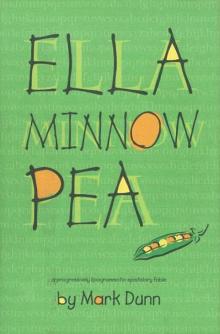 Ella Minnow Pea
Ella Minnow Pea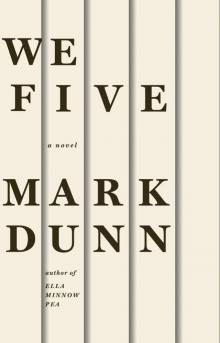 We Five
We Five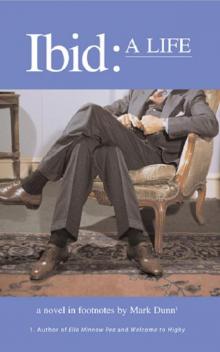 IBID: A Life
IBID: A Life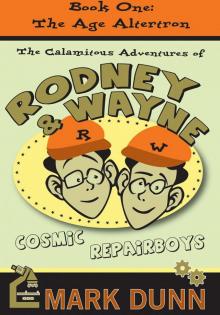 The Calamitous Adventures of Rodney and Wayne, Cosmic Repairboys: The Age Altertron
The Calamitous Adventures of Rodney and Wayne, Cosmic Repairboys: The Age Altertron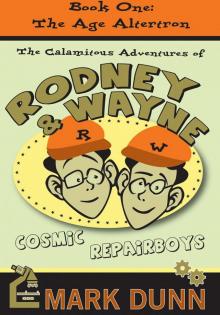 The Age Altertron
The Age Altertron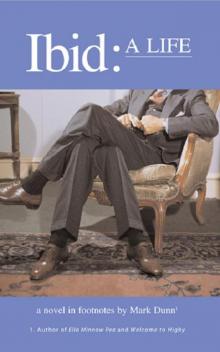 IBID
IBID